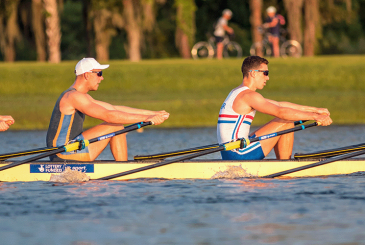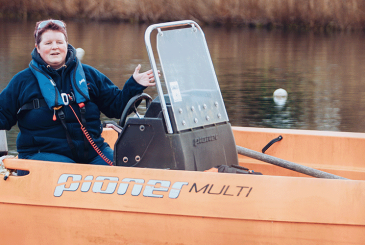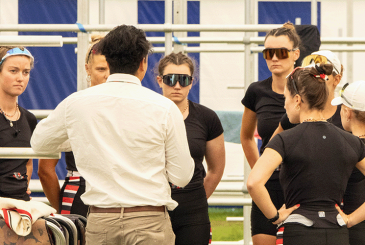A highlight of the season, training camps are a chance to get away with clubmates and focus on nothing but rowing. They can also be very intense experiences, but careful planning will help everything run smoothly and allow everyone to get as much out of the camp as possible. Zoe Gullen explores the various aspects you need to cover.
Setting the purpose
Before deciding who, what, when and where, establish the why of the training camp: what is the main objective? It might be to develop skills, selection, to increase training volume, warm-weather training to break up the winter grind or to transition into summer racing, or a finishing camp for established crews ahead of a target regatta.
Defining the objective will inform decisions such as the facilities required – do you need a buoyed course for seat racing? – and the ideal length of the camp. A week to ten days offer a good block of solid, focused training, but can risk diminishing returns from mental and physical fatigue. A shorter duration can mean intense focus, but less opportunity to make significant progress.
For any camp, scheduling around weekends and bank holidays will help minimise time taken off work.
Where to go?
Overseas camps at dedicated training centres are always popular. They really give a sense of being away from it all, often in guaranteed good weather and a new and very beautiful environment. But this option can be pricey, and the logistics involved in towing a trailer to the EU are considerable (more on this below).

Many UK clubs offer training-camp facilities too, though. A UK-based camp can make travel arrangements simpler and quicker, as well as building links between clubs and bringing in revenue for the host.
Finally, of course, there’s no place like home: a camp based at your own club can be very productive, and cost-effective. There does, however, need to be a firm commitment to the camp from everyone taking part, to minimise the distractions of everyday life.
Costs
A camp of any scale will have certain overheads, such as boating fees, hire of equipment and fuel for launches and vehicles, in addition to travel, accommodation and lots and lots of food.
Add a small contingency for unforeseen costs
Try to establish these costs as early as possible, and then work out the minimum number of attendees required to make the camp financially viable.
Decide whether coaches’ expenses are to be covered or subsidised, and again add this to the cost to be shared. Also consider whether travel will be included, or if athletes are to make their own arrangements and so have some flexibility.
Payment in instalments helps attendees to spread the cost of the camp – and also for organisers to fine-tune exact costs as they are confirmed. If travelling abroad, remember to take any fluctuations in the exchange rate into account; it can also be helpful to add a small contingency for unforeseen costs – to be refunded if, in the final reckoning, costs were overestimated.
Equipment
The objective of the camp will also help decide who attends, and what equipment they require. Different groups or crews may have to share boats, so ensure that they are suitable for all groups and can easily be adjusted between outings.
Draw up a trailer plan for quick and efficient loading, with everyone knowing exactly what is to go where. Also have a detailed list of all everything else, from blades to tools and spare washers, to make sure nothing is forgotten – and, just as importantly, is packed up safely for the journey home. Take extra boat ties, as they are easily lost, and don’t forget chargers for coxboxes and other electronics – plus adapters, if going abroad.

Another option is to hire equipment at the camp venue, which removes the need for trailering. If hiring, find out what is available and what adjustments can be made: are boats and blades to be used ‘as is’, or can they be re-rigged? Also note what will need to be taken with you, such as lifejackets or megaphones.
In all cases, check that everything is adequately insured, including – if applicable – for use outside the UK.
Transport and travel
Plan the route, including rest and refuelling stops, and make sure that the trailer-driving team have all documentation in the vehicle, along with an up-to-date satnav and a paper map. Budget plenty of time: it’s vital to travel safely, take plenty of rest stops and make regular trailer checks, rather than be rushing to catch a ferry, or to have boats ready for the first outing.
Taking a trailer abroad now requires considerable paperwork. Read the GB Rowing Team’s guide to Towing Rowing Trailers to the EU for details of everything you need to do.
Training camps are tiring and intense, and there needs to be enough room for decent rest and recovery
Bed and board
This can be an area for flexibility in costs, depending on the type of accommodation or number of people to a room. But avoid false economies: training camps are tiring and intense, and there needs to be enough room for decent rest and recovery, and, for some, privacy in downtime – in particular, remember that coaches are working, and so should not be expected to be available 24/7. Camps are a great opportunity for bonding and a communal lounge will help this.
If it’s a junior camp, or juniors will be attending along with seniors, safeguarding and supervision procedures, as set out in British Rowing’s guidelines, must be put in place with the help of your club welfare officer. Camps ahead of the regatta season are also ahead of the exam season, so ensure quiet areas are available for study sessions timetabled alongside training.
Make sure that the food options available are suitably nutritious to support intense training, and that any dietary requirements can be taken into account. Also find out where to buy snacks and, if half-board, lunches, and whether there are opportunities to go out to eat in the evenings.
Opting for self-catering accommodation can help to keep costs down, with a cooking and shopping rota giving crews the opportunity to show off culinary prowess. But it can be a big ask for athletes to take on kitchen duties – and the washing-up – at the end of a day’s training.
Safety
Safety is paramount, and your club safety adviser should be involved in drawing up a safety plan and conducting a risk assessment for the camp; RowSafe includes a dedicated section on organising training camps overseas. Liaise with the venue to find out about particular risks and for information such as circulation patterns and prevailing weather conditions, and organise a safety briefing for the start of the camp.

Training plans
Consider the experience, fitness levels and aims of the athletes, to set a challenging but realistic training programme that stretches athletes and achieves the camp’s objectives. Each squad should have at least one half day off in a week-long camp.
The plan needs to be adaptable, to take into account bad weather and illness or injury. And think about options for cross-training, which can be a fun diversion and shake up the established crew order.
Most camps finish with a mini-regatta
A progressive training programme could work towards racing on the last day, to round off the camp and end on a high before returning to regular life and training. Use data collected from timed pieces throughout the week to devise and apply handicaps for meaningful and close side-by-side racing. Also, percentage of gold medal speeds can be used to compare times across boat classes and genders, or put together mixed-ability crews for fun scratch racing or skills challenges.
Most camps finish with a mini-regatta, complete with race registration, control commission, heats and finals – and, of course, prizes – as a dress rehearsal for the regatta season ahead. And don’t forget to take a ‘survivors’ photo at the end!

Photos: Aba Carboo and Mary Mortimer










